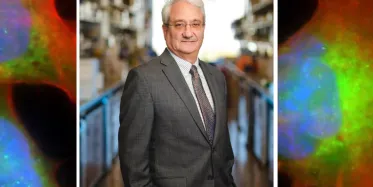Daniel Kulp, Ph.D.
-
Associate Professor, Vaccine & Immunotherapy Center
Kulp has more than 15 years of experience developing molecular design software and leading protein engineering projects. He joined Wistar from The Scripps Research Institute and International AIDS Vaccine Initiative where he was a principal scientist.
Kulp received a bachelor’s degree in Computer Science and Molecular Biology & Biochemistry from Rutgers, The State University of New Jersey, followed by a Ph.D. in Biochemistry and Molecular Biophysics from the University of Pennsylvania. He completed postdoctoral training in structure-based and experimental protein engineering at Los Alamos National Laboratory.
The Kulp Laboratory

The Kulp Laboratory
The Kulp laboratory focuses on rational vaccine and therapeutic antibody design for a variety of priority infectious diseases (e.g. Lassa Virus, HIV, Influenza) and cancer targets. The ultimate test of the lab’s understanding of B cell immune responses is to design new immunogens that drive predictable antibody maturation. To that end, the lab is interested in the development and application of protein engineering methods for modifying antigen/cell receptor interfaces, antigen/antibody interfaces, antigen surface properties and core stabilization.
-
Postdoctoral Fellows
Jinwei Huang, Ph.D.
Kylie Konrath, Ph.D. -
Graduate Students
Michaela Helble (Ph.D.)
Rumi Habib (Ph.D.)
Niklas Laenger (Ph.D.)
Shahlo Solieva (Ph.D.)
Yuanhan Wu (Ph.D)
Colby Agostino (Ph.D.)
Martina Tomirotti (Ph.D.)
Sam Garfinkle (M.D./Ph.D.)
Andrew Nelson (M.D./Ph.D.)
Sarah Kim (M.S.) -
Research Assistants
Kelly Bayruns
Amber Kim
Joyce Park
Madison McCanna
-
Lab Alumni
Susanne Walker, Ph.D. – Merck
Neethu Chokkalingkam – Spark Therapeutics
Sinja Kriete – Lake Erie College of Osteopathic Medicine (D.O. Student)
Nicholas Shupin – Robert Wood Johnson Medical School (M.D. student)
Alana Huynh – University of Rochester (Ph.D. student)
Kulp Lab in the News
Selected Publications
- Growing Glycans in Rosetta: Accurate de novo glycan modeling, density fitting, and rational sequon design June 24, 2024Carbohydrates and glycoproteins modulate key biological functions. However, experimental structure determination of sugar polymers is notoriously difficult. Computational approaches can aid in carbohydrate structure prediction, structure determination, and design. In this work, we developed a glycan-modeling algorithm, GlycanTreeModeler, that computationally builds glycans layer-by-layer, using adaptive kernel density estimates (KDE) of common glycan conformations derived from […]Jared Adolf-Bryfogle
- In vivo delivery of engineered synthetic DNA-encoded SARS-CoV-2 monoclonal antibodies for pre-exposure prophylaxis in non-human primates January 2, 2024COVID-19 remains a major public health concern. Monoclonal antibodies have received emergency use authorization (EUA) for pre-exposure prophylaxis against COVID-19 among high-risk groups for treatment of mild to moderate COVID-19. In addition to recombinant biologics, engineered synthetic DNA-encoded antibodies (DMAb) are an important strategy for direct in vivo delivery of protective mAb. A DMAb cocktail […]Ami Patel
- Delineation of DNA and mRNA COVID-19 vaccine-induced immune responses in preclinical animal models November 27, 2023Nucleic acid vaccines are designed based on genetic sequences (DNA or mRNA) of a target antigen to be expressed in vivo to drive a host immune response. In response to the COVID-19 pandemic, mRNA and DNA vaccines based on the SARS-CoV-2 Spike antigen were developed. Surprisingly, head-to-head characterizations of the immune responses elicited by each […]Viviane M Andrade
- Engineered antibody cytokine chimera synergizes with DNA-launched nanoparticle vaccines to potentiate melanoma suppression <em>in vivo</em> March 13, 2023Cancer immunotherapy has demonstrated great promise with several checkpoint inhibitors being approved as the first-line therapy for some types of cancer, and new engineered cytokines such as Neo2/15 now being evaluated in many studies. In this work, we designed antibody-cytokine chimera (ACC) scaffolding cytokine mimetics on a full-length tumor-specific antibody. We characterized the pharmacokinetic (PK) […]Nicholas J Tursi
- Gene-encoded nanoparticle vaccine platforms for in vivo assembly of multimeric antigen to promote adaptive immunity February 22, 2023Nanoparticle vaccines are a diverse category of vaccines for the prophylaxis or treatment of various diseases. Several strategies have been employed for their optimization, especially to enhance vaccine immunogenicity and generate potent B-cell responses. Two major modalities utilized for particulate antigen vaccines include using nanoscale structures for antigen delivery and nanoparticles that are themselves vaccines […]Nicholas J Tursi
- A mAb against surface-expressed FSHR engineered to engage adaptive immunity for ovarian cancer immunotherapy December 12, 2022Despite advances in ovarian cancer (OC) therapy, recurrent OC remains a poor-prognosis disease. Because of the close interaction between OC cells and the tumor microenvironment (TME), it is important to develop strategies that target tumor cells and engage components of the TME. A major obstacle in the development of OC therapies is the identification of […]Devivasha Bordoloi
- DNA-delivered antibody cocktail exhibits improved pharmacokinetics and confers prophylactic protection against SARS-CoV-2 October 6, 2022Monoclonal antibody therapy has played an important role against SARS-CoV-2. Strategies to deliver functional, antibody-based therapeutics with improved in vivo durability are needed to supplement current efforts and reach underserved populations. Here, we compare recombinant mAbs COV2-2196 and COV2-2130, which compromise clinical cocktail Tixagevimab/Cilgavimab, with optimized nucleic acid-launched forms. Functional profiling of in vivo-expressed, DNA-encoded […]Elizabeth M Parzych
- Mucosal chemokine adjuvant enhances synDNA vaccine-mediated responses to SARS-CoV-2 and provides heterologous protection in vivo July 15, 2022The global coronavirus disease 2019 (COVID-19) pandemic has claimed more than 5 million lives. Emerging variants of concern (VOCs) continually challenge viral control. Directing vaccine-induced humoral and cell-mediated responses to mucosal surfaces may enhance vaccine efficacy. Here we investigate the immunogenicity and protective efficacy of optimized synthetic DNA plasmids encoding wild-type severe acute respiratory syndrome […]Ebony N Gary
- PyRosetta Jupyter Notebooks Teach Biomolecular Structure Prediction and Design February 7, 2022Biomolecular structure drives function, and computational capabilities have progressed such that the prediction and computational design of biomolecular structures is increasingly feasible. Because computational biophysics attracts students from many different backgrounds and with different levels of resources, teaching the subject can be challenging. One strategy to teach diverse learners is with interactive multimedia material that […]Kathy H Le
- Induction of tier-2 neutralizing antibodies in mice with a DNA-encoded HIV envelope native like trimer February 5, 2022HIV Envelope (Env) is the main vaccine target for induction of neutralizing antibodies. Stabilizing Env into native-like trimer (NLT) conformations is required for recombinant protein immunogens to induce autologous neutralizing antibodies(nAbs) against difficult to neutralize HIV strains (tier-2) in rabbits and non-human primates. Immunizations of mice with NLTs have generally failed to induce tier-2 nAbs. […]Ziyang Xu
- Nucleic acid delivery of immune-focused SARS-CoV-2 nanoparticles drives rapid and potent immunogenicity capable of single-dose protection January 29, 2022Severe acute respiratory syndrome coronavirus 2 (SARS-CoV-2) vaccines may target epitopes that reduce durability or increase the potential for escape from vaccine-induced immunity. Using synthetic vaccinology, we have developed rationally immune-focused SARS-CoV-2 Spike-based vaccines. Glycans can be employed to alter antibody responses to infection and vaccines. Utilizing computational modeling and in vitro screening, we have […]Kylie M Konrath
- Harnessing Recent Advances in Synthetic DNA and Electroporation Technologies for Rapid Vaccine Development Against COVID-19 and Other Emerging Infectious Diseases January 20, 2022DNA vaccines are considered as a third-generation vaccination approach in which antigenic materials are encoded as DNA plasmids for direct in vivo production to elicit adaptive immunity. As compared to other platforms, DNA vaccination is considered to have a strong safety profile, as DNA plasmids neither replicate nor elicit vector-directed immune responses in hosts. While […]Ziyang Xu
- Intradermal-delivered DNA vaccine induces durable immunity mediating a reduction in viral load in a rhesus macaque SARS-CoV-2 challenge model October 4, 2021Coronavirus disease 2019 (COVID-19), caused by the SARS-CoV-2 virus, has had a dramatic global impact on public health and social and economic infrastructures. Here, we assess the immunogenicity and anamnestic protective efficacy in rhesus macaques of an intradermal (i.d.)-delivered SARS-CoV-2 spike DNA vaccine, INO-4800, currently being evaluated in clinical trials. Vaccination with INO-4800 induced T […]Ami Patel
- A DNA-Launched Nanoparticle Vaccine Elicits CD8<sup>+</sup> T-cell Immunity to Promote <em>In Vivo</em> Tumor Control September 11, 2020Cytolytic T cells (CTL) play a pivotal role in surveillance against tumors. Induction of CTL responses by vaccination may be challenging, as it requires direct transduction of target cells or special adjuvants to promote cross-presentation. Here, we observed induction of robust CTL responses through electroporation-facilitated, DNA-launched nanoparticle vaccination (DLnano-vaccines). Electroporation was observed to mediate transient […]Ziyang Xu
- SARS-CoV-2 Assays To Detect Functional Antibody Responses That Block ACE2 Recognition in Vaccinated Animals and Infected Patients August 29, 2020Severe acute respiratory syndrome coronavirus 2 (SARS-CoV-2) has caused a global pandemic of COVID-19, resulting in cases of mild to severe respiratory distress and significant mortality. The global outbreak of this novel coronavirus has now infected >20 million people worldwide, with >5 million cases in the United States (11 August 2020). The development of diagnostic […]Susanne N Walker
- Incorporation of a Novel CD4+ Helper Epitope Identified from Aquifex aeolicus Enhances Humoral Responses Induced by DNA and Protein Vaccinations August 9, 2020CD4+ T cells play an important role in the maturation of the antibody responses. Conjugation of identified CD4+ T cell helper epitope to the target antigen has been developed as a strategy to enhance vaccine-induced humoral immunity. In this work, we reported the identification of a novel HLA-IAb helper epitope LS-3 from Aquifex aeolicus. In […]Ziyang Xu
- Immunogenicity of a DNA vaccine candidate for COVID-19 May 21, 2020The coronavirus family member, SARS-CoV-2 has been identified as the causal agent for the pandemic viral pneumonia disease, COVID-19. At this time, no vaccine is available to control further dissemination of the disease. We have previously engineered a synthetic DNA vaccine targeting the MERS coronavirus Spike (S) protein, the major surface antigen of coronaviruses, which […]Trevor R F Smith
- Author Correction: A Engineered immunogen binding to alum adjuvant enhances humoral immunity May 15, 2020An amendment to this paper has been published and can be accessed via a link at the top of the paper.Tyson J Moyer
- In Vivo Assembly of Nanoparticles Achieved through Synergy of Structure-Based Protein Engineering and Synthetic DNA Generates Enhanced Adaptive Immunity April 25, 2020Nanotechnologies are considered to be of growing importance to the vaccine field. Through decoration of immunogens on multivalent nanoparticles, designed nanovaccines can elicit improved humoral immunity. However, significant practical and monetary challenges in large-scale production of nanovaccines have impeded their widespread clinical translation. Here, an alternative approach is illustrated integrating computational protein modeling and adaptive […]Ziyang Xu
- Engineered immunogen binding to alum adjuvant enhances humoral immunity February 19, 2020Adjuvants are central to the efficacy of subunit vaccines. Aluminum hydroxide (alum) is the most commonly used vaccine adjuvant, yet its adjuvanticity is often weak and mechanisms of triggering antibody responses remain poorly understood. We demonstrate that site-specific modification of immunogens with short peptides composed of repeating phosphoserine (pSer) residues enhances binding to alum and […]Tyson J Moyer


